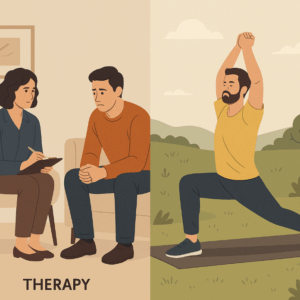🌿 Treating Depression Without Medications: Therapy and Exercise That Work
 Depression is one of the leading causes of disability worldwide. While antidepressants are widely prescribed and often effective, many people prefer non-medication strategies — either as the first step, or alongside medicines for a more holistic recovery.
Depression is one of the leading causes of disability worldwide. While antidepressants are widely prescribed and often effective, many people prefer non-medication strategies — either as the first step, or alongside medicines for a more holistic recovery.
Research consistently shows that psychological therapies and structured exercise programs can significantly reduce depression symptoms, sometimes with results comparable to medications.
🧠 Therapy Approaches for Depression
1. Cognitive–Behavioural Therapy (CBT)
-
What it is: CBT teaches patients to identify negative thought patterns (“I am worthless”) and replace them with balanced, constructive thinking.
-
Method: Includes behavioural activation — encouraging engagement in pleasurable, meaningful activities.
-
Evidence: Meta-analyses confirm CBT is as effective as antidepressants in mild-to-moderate depression, with longer-lasting protection against relapse.
2. Interpersonal Therapy (IPT)
-
What it is: Focuses on relationships, communication, and role transitions (such as job change, bereavement, or family stress).
-
Method: Helps patients identify and resolve interpersonal conflicts that contribute to depression.
-
Evidence: Controlled trials show IPT is particularly effective in depression linked to grief, role conflicts, and relationship difficulties.
3. Mindfulness-Based Cognitive Therapy (MBCT)
-
What it is: Combines CBT with mindfulness meditation.
-
Method: Teaches awareness of thoughts and feelings without over-identifying with them.
-
Evidence: Proven to reduce relapse risk in recurrent depression by up to 50%.
4. Acceptance and Commitment Therapy (ACT)
-
What it is: Encourages acceptance of painful emotions while pursuing valued life goals.
-
Method: Uses mindfulness and values-based action plans.
-
Evidence: Growing research shows ACT improves resilience and reduces depressive symptoms, especially when chronic stress is involved.
5. Supportive Therapy and Counselling
-
What it is: Provides empathy, validation, and coping strategies.
-
Method: Patient-centred discussions, reassurance, stress management.
-
Evidence: Supportive therapy enhances treatment adherence and subjective well-being, especially when combined with structured interventions.
🏃♂️ Exercise as Treatment for Depression
1. Aerobic Exercise
-
What it is: Walking, running, cycling, swimming.
-
Method: 30–45 minutes, 4–5 days a week.
-
Evidence: Harvard and Duke University studies show aerobic exercise is as effective as antidepressants in mild-to-moderate depression.
2. Strength Training
-
What it is: Resistance training with weights or body weight.
-
Method: 2–3 sessions per week.
-
Evidence: Systematic reviews confirm strength training reduces depressive symptoms and improves self-esteem.
3. Yoga
-
What it is: Combines asanas (postures), pranayama (breathing), and meditation.
-
Method: Regular sessions at least 3 times a week.
-
Evidence: RCTs show yoga reduces stress hormones (cortisol) and improves mood, energy, and sleep in people with depression.
4. Mind–Body Exercises
-
What it is: Tai Chi, Qigong, Pilates, mindful walking.
-
Method: Gentle, rhythmic movements with breathing focus.
-
Evidence: Studies demonstrate improvements in mood, vitality, and quality of life.
5. Breathing and Relaxation Techniques
-
What it is: Diaphragmatic breathing, progressive muscle relaxation, guided imagery.
-
Evidence: Shown to reduce rumination, sleep disturbances, and anxiety symptoms that worsen depression.
⚖️ Therapy + Exercise: A Holistic Model
-
Therapy retrains the mind → addressing thought patterns, interpersonal stress, and relapse risk.
-
Exercise retrains the body → enhancing energy, sleep, motivation, and brain chemistry.
-
When combined, they form a sustainable, empowering, and side-effect-free approach to depression.
💡 Key Takeaway
Depression doesn’t always require tablets alone. Therapy and exercise are powerful, evidence-based strategies that can work independently or in combination with medications. For many patients, they not only improve mood but also build resilience for the future.
👨⚕️ Consultation
I’m Dr. Srinivas Rajkumar T, Consultant Psychiatrist at Apollo Clinic, Velachery, Chennai.
I help patients with depression using a personalised combination of therapy, lifestyle strategies, and — where necessary — safe medications.
📞 Contact: +91 8595155808